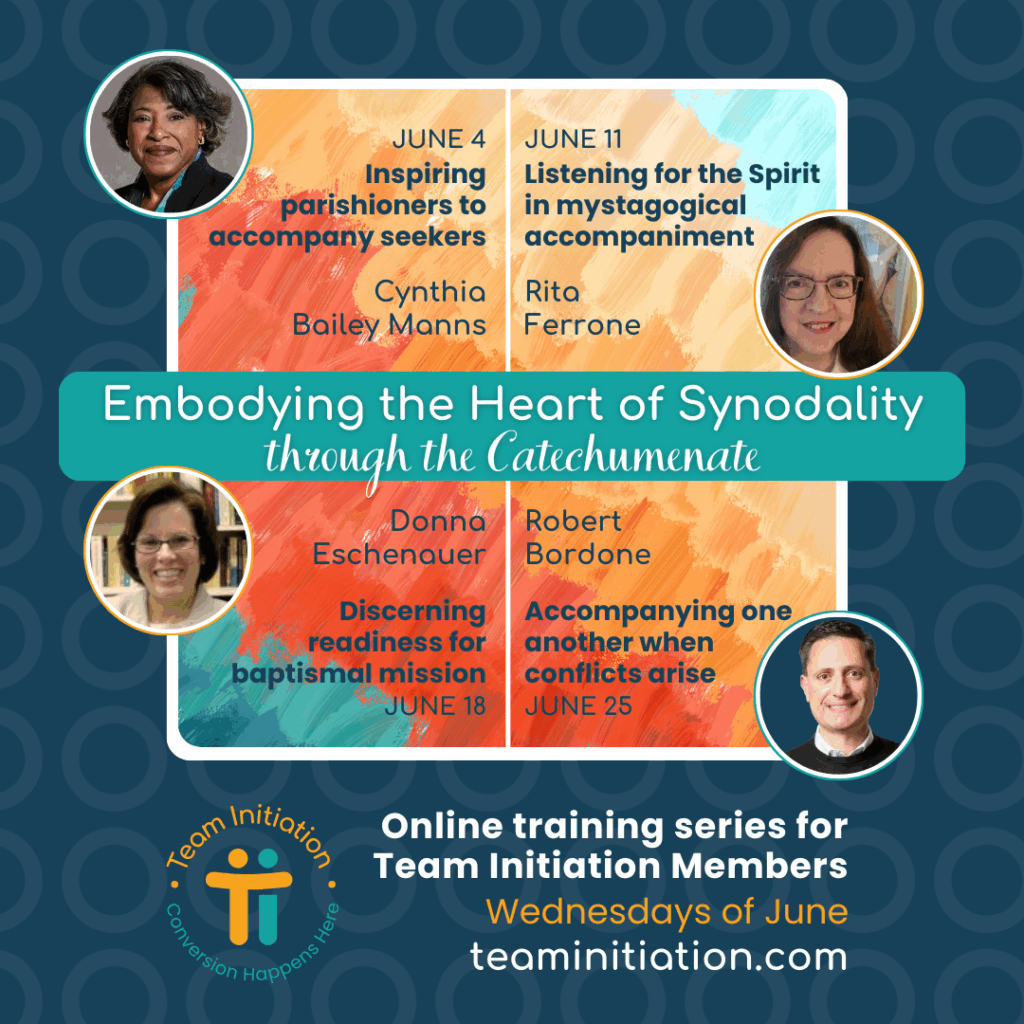You’ve likely heard, or perhaps experienced firsthand, the frustration: after the joy of the Easter Vigil, getting the neophytes to attend follow-up sessions during the period of mystagogy can feel like an uphill battle.
Many catechumenate leaders struggle with low attendance at these gatherings. I’ve heard suggestions for improving attendance that include providing the dates for these sessions from the very beginning of the catechumenate or even withholding baptismal certificates until attendance requirements are met. But what if the key to a powerful period of mystagogy isn’t about maximizing attendance at supplementary classes, but about something much more central to our faith?
Deepening the Paschal Mystery
The period of mystagogy, which follows the celebration of Christian initiation at the Easter Vigil, is a crucial phase in the journey of faith. The Order of Christian Initiation of Adults identifies this as a time for “the community together with the neophytes, by meditation on the Gospel, by participation in the Eucharist, and by the exercise of charity, [to make] progress in understanding the Paschal Mystery more deeply and carrying it over more and more into the practice of daily life” (244).
Note that the focus of this period is not centered solely on the neophytes, but on the entire community. The “why” of mystagogy is for everyone to grow in understanding and living the Paschal Mystery in their daily lives.
Meditation, Eucharist, and charity in the Sunday Mass
So how do accomplish this important goal? The method is given to us in the paragraph we just quoted. The neophytes and the community come to understand the Paschal Mystery more deeply and live it out by doing three things:
- meditation on the Gospel,
- participation in the eucharist,
- and doing the works of charity
The Order of Christian Initiation of Adults emphasizes that meditation on the Gospel, participation in the Eucharist, and inspiration to and training for apostolic charity happens not in sessions outside of Mass but in the “principal place for ‘Mystagogy,’” which is the Sunday Masses of the Easter seasons (see 247).
This means that the primary “job” of the neophytes during the period of mystagogy is to take part in the Sunday Masses for neophytes. The entire parish community celebrates with them. The richness of the Easter season readings, particularly those in Year A, are chosen specifically to help both the neophytes and the community deepen their grasp of the Paschal Mystery.
The primary “job” of the neophytes during the period of mystagogy is to take part in the Sunday Masses for neophytes. The entire parish community celebrates with them.
Redefining success
Given the clear teaching of the church, then, the “secret” to a powerful period of mystagogy really is not secret at all. If the job of the neophytes is to participate in these Masses, our job is to do everything we can to make the eight Sunday liturgies during the Easter season as excellent as we possibly can. Our ever-deepening union with Jesus, which the catechumenate process strives for, happens in the Eucharist, and it takes these “eight in a row” Sunday encounters to truly ground the neophytes in this central mystery.
So, when catechumenate leaders express frustration that neophytes are participating in Sunday Mass but not extra sessions or classes, they might be missing the point. If the neophytes are consistently showing up for the Sunday liturgies, they are actively engaging in the core practice of mystagogy. This not a failure, but rather a success. It is a sign that the neophytes are living out the “apprenticeship” in Christian life that the catechumenate process trained them in.
Optional gatherings are supplemental, not mandatory
Having said all this, I don’t think there is anything wrong with offering optional gatherings outside of the liturgy. Some neophytes may welcome the opportunity to break open their experience or learn more about Christian teaching. But we always have to see these gatherings as optional and secondary to the Sunday liturgy.
If these sessions are not well-attended, it might be an invitation for leaders to reflect on their content and appeal, rather than viewing it as a failure on the part of the neophytes. Withholding sacramental certificates or making attendance mandatory for supplementary sessions contradicts the spirit of welcoming and accompanying the newly initiated into the life of the community.
Withholding sacramental certificates or making attendance mandatory for supplementary sessions contradicts the spirit of welcoming and accompanying the newly initiated into the life of the community.
Mystagogy as a synodal journey
Furthermore, the church’s vision for the period of mystagogy aligns with the teaching on synodality. Synodality is a way of being church in which all members journey together, gather in assembly, and take an active part in the evangelizing mission. Mystagogy, as a form of post-baptismal catechesis, embodies this synodal spirit. It’s a time for the community and neophytes to walk together, deepening their faith through shared experience, especially the communal participation in the Eucharist.
This journeying together involves listening to one another and discerning how to live and share the faith. By actively participating in the Sunday liturgies as a unified community, neophytes and long-term members are living out this synodal call to walk forward together, listening to the Holy Spirit and the Word of God, to participate in the mission of the church.
Celebrate participation in the liturgy
A powerful period of mystagogy, then, is achieved not through mandatory extra classes, but by celebrating the Sunday Masses of the Easter season with excellence and full participation from the entire community.
If your neophytes are faithfully participating in these liturgies, celebrate this success! They are living out the core of their call and deepening their union with Christ and the community in the most vital way possible during this period. By shifting the focus from session attendance to vibrant, communal worship, catechumenate teams can truly unlock the transformative power of mystagogy for everyone.
What’s stirring in you right now?
If a word or phrase comes to mind—something this piece awakened or echoed in your own experience—I’d love to hear it. Drop it in the comments below and join the conversation. This dialogue grows richer with your perspective.
Coming This June: A Journey of Accompaniment and Mission!

Team Initiation Members—don’t miss our upcoming exclusive four-part online speaker series:
Embodying the Heart of Synodality through the Catechumenate
Join us as we explore what it means to walk with seekers and parishioners in a spirit of accompaniment.
📅 Mark your calendars:
Four Wednesdays in June 2025
11:00am Pacific / 2:00pm Eastern
(June 4, 11, 18, and 25)
👉 This series is available only to Team Initiation Members.
Not a member yet? Click here to join today.


















